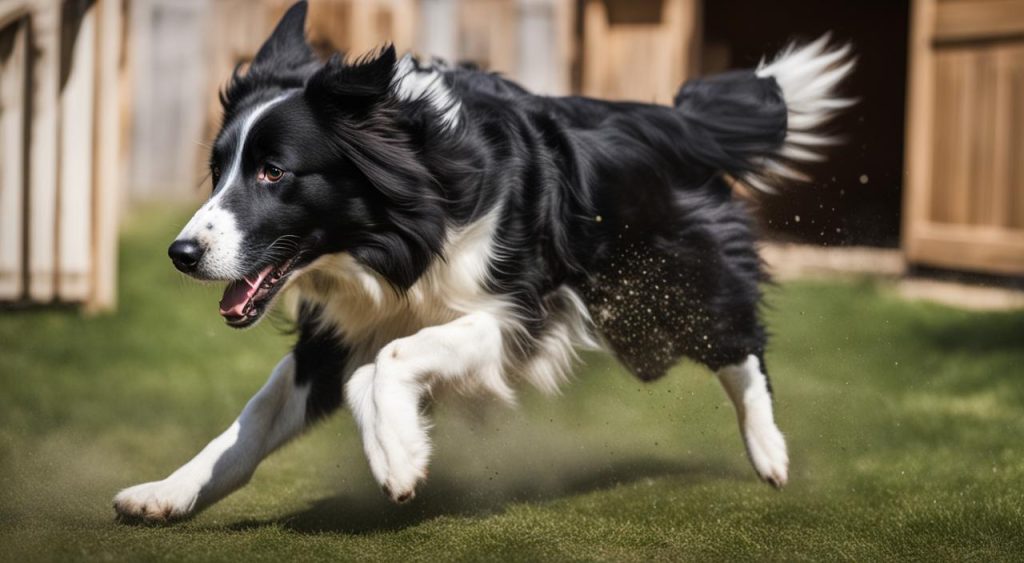Border Collies are known for their intelligence, agility, and energy. However, these traits can sometimes lead to behavior issues if not properly managed. Understanding the natural instincts and needs of Border Collies is crucial in preventing and addressing behavior problems.
Border Collies have a strong drive to chase, herd, and bond. They are highly sensitive to movement and sound, making them easily stimulated by their surroundings. If these instincts are not channeled appropriately, behavior problems can arise. Additionally, poor handling, trauma, and limited socialization can contribute to common behavioral issues in Border Collies.
Common behavior problems in Border Collies include aggression, attention seeking, biting, nipping, chasing, dominance issues, excessive vocalization, chewing, digging, inappropriate soiling, obsessive-compulsive disorder, and separation anxiety. These problems may occur due to breed traits, lack of proper socialization, or inadvertent reinforcement of negative behaviors by owners.
Training and managing Border Collie behavior issues require effective strategies. Positive reinforcement and consistency are key in training Border Collies. Behavior correction techniques such as redirecting attention, setting boundaries, and providing appropriate outlets for energy can be helpful. Obedience training is important for teaching basic commands and manners. Additionally, addressing mental and physical stimulation needs, maintaining a consistent routine, and considering underlying health or environmental factors can aid in preventing and managing behavior problems in Border Collies.
Key Takeaways:
- Border Collies may develop behavior problems if their instincts and energy needs are not appropriately managed.
- Common behavior issues in Border Collies include aggression, attention seeking, chasing, dominance, and separation anxiety.
- Training methods should focus on positive reinforcement and consistency.
- Behavior correction involves redirecting attention, setting boundaries, and providing appropriate outlets for energy.
- Obedience training is crucial for teaching basic commands and manners.
Common Behavioral Problems in Border Collies
Border Collies are known for their intelligence and agility, but they can also be prone to certain behavioral problems. Understanding these issues is crucial for providing proper care and training for your Border Collie.
One of the most common behavioral problems seen in Border Collies is aggression. This can manifest as growling, biting, or nipping. It’s important to address aggression issues early on to prevent any potential harm.
Attention seeking is another behavior problem often seen in Border Collies. These dogs are known for their high energy levels and strong desire for stimulation. If they don’t receive enough attention or mental and physical exercise, they may resort to attention-seeking behaviors such as barking or whining.
Biting, nipping, and gripping are also common behavioral problems in Border Collies. This can be a result of their herding instincts, but it’s important to train them to control their mouth and jaws in a gentle and appropriate manner.
Chasing can be another problematic behavior in Border Collies. Their instinct to chase can lead them to go after cars, running children, or small animals, posing a danger to themselves and others.
Dominance issues can also arise in Border Collies, especially if they are not properly socialized or if their owners inadvertently reinforce dominant behaviors. It’s important to establish yourself as the pack leader through consistent and positive training.
Excessive vocalization, such as barking or whimpering, can be another behavioral problem in Border Collies. This can be triggered by boredom, anxiety, or a need for attention.
Chewing, digging, and inappropriate soiling are common destructive behaviors in Border Collies. Providing them with appropriate chew toys, designated digging areas, and consistent potty training can help address these problems.
Obsessive-compulsive disorder (OCD) can also manifest in Border Collies, leading to repetitive and compulsive behaviors. This can include tail-chasing, shadow-chasing, or excessive licking.
Separation anxiety is another common problem in Border Collies. Their strong bond with their owners can lead to distress when left alone, resulting in destructive behaviors or excessive vocalization.
By being aware of these common behavioral problems, owners can take proactive steps to address and manage them through proper training, socialization, and environmental enrichment.
Strategies for Training and Managing Border Collie Behavior Issues
When it comes to addressing and preventing behavior issues in Border Collies, effective training and management techniques are key. By focusing on positive reinforcement and consistency, you can guide your Border Collie towards better behavior and a happier life. Here are some strategies to help you in training and managing your Border Collie’s behavior issues:
1. Positive Reinforcement:
Use rewards such as treats, praise, and playtime to reinforce desired behaviors. This approach helps your Border Collie associate good behavior with positive outcomes, making them more likely to repeat those behaviors.
2. Behavior Correction:
When your Border Collie displays unwanted behavior, it’s important to correct it effectively. Redirect their attention to a more appropriate activity or behavior, set clear boundaries, and provide outlets for their energy and instincts. This helps them understand what is expected and encourages better behavior.
3. Obedience Training:
Obedience training is crucial for teaching your Border Collie basic commands and manners. Focus on commands like sit, stay, come, and leash walking. This not only enhances their obedience but also strengthens the bond between you and your furry companion.
4. Behavior Management:
In addition to training, behavior management plays a vital role in preventing and managing behavior problems in Border Collies. Provide plenty of mental and physical stimulation through activities like puzzle toys, interactive games, and regular exercise. Establish and maintain a consistent routine to give them structure, and address any underlying health or environmental factors that may contribute to behavior issues.
By implementing these strategies, you can effectively train and manage your Border Collie’s behavior, ensuring a harmonious and well-behaved companion. Remember to be patient, consistent, and always focus on positive reinforcement. With time and dedication, you’ll see positive changes in your Border Collie’s behavior.
Conclusion
Border Collies are a highly intelligent and active breed that require specific training and management to prevent and address behavior issues. Understanding their instincts and providing appropriate training and socialization are essential in fostering a well-behaved and happy Border Collie.
By implementing effective training techniques, such as positive reinforcement and consistency, owners can establish a positive and harmonious relationship with their Border Collies. This includes redirecting their attention, setting boundaries, and providing outlets for their energy and instincts.
In addition to training, behavior management strategies play a crucial role in preventing and minimizing behavior problems. Providing mental and physical stimulation, maintaining a consistent routine, and addressing any underlying health or environmental factors are key aspects of effective behavior management for Border Collies.
With proper understanding, training, and management, owners can create a loving and well-behaved companion in their Border Collie. By meeting their specific behavioral needs and addressing any issues early on, owners can enjoy a fulfilling and rewarding relationship with their beloved Border Collie.





